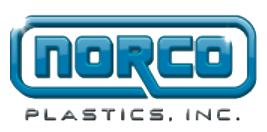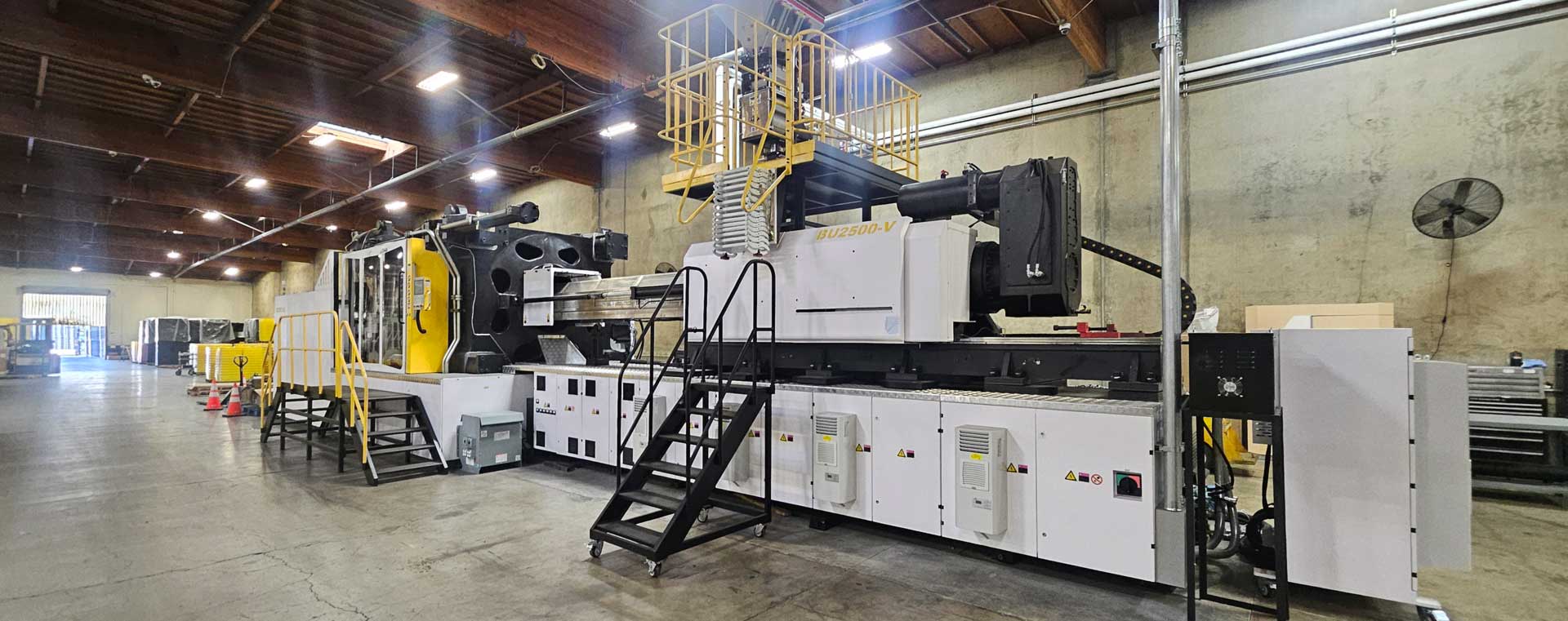
Large Tonnage Injection Molding Specialists in Southern California
2800 Ton
MAXIMUM CLAMP TONNAGE
FOR LARGE PART MANUFACTURING
1000 oz
MAXIMUM SHOT SIZE
FOR SUBSTANTIAL PARTS
Large Tonnage
ADVANCED INJECTION MOLDING
FOR ENHANCED PERFORMANCE
Advanced Large Tonnage Injection Molding Technology
Our facility houses advanced large tonnage injection molding machines ranging from 390 to 2800 ton of clamp tonnage, with shot capacity up to 1000 oz. Each molding machine is calibrated for precision production. This substantial clamping force enables us to produce exceptionally large plastic parts with the precision and quality our clients expect. A large injection molding process requires specialized equipment that few manufacturers maintain. Our high-capacity molding machine delivers consistent quality for large part production across multiple industries.
2800 Ton Clamp Tonnage
Our largest machine delivers 2800 tons of clamp tonnage for exceptionally large and complex parts.
1000 oz Shot Capacity
Our molding machine can deliver up to 1000 oz of material shot capacity for large part production with consistent quality.
Large Injection Molding
Specialized manufacturing process with our largest injection molding machine creating lightweight parts with exceptional strength.
Tour Our Large Tonnage Injection Molding Machine
Experience our massive 2800 ton machine in action. This advanced equipment provides exceptional clamp tonnage necessary for large-scale production. With this machine, we can produce parts requiring extreme pressure to fill complex molds with precision and consistency.
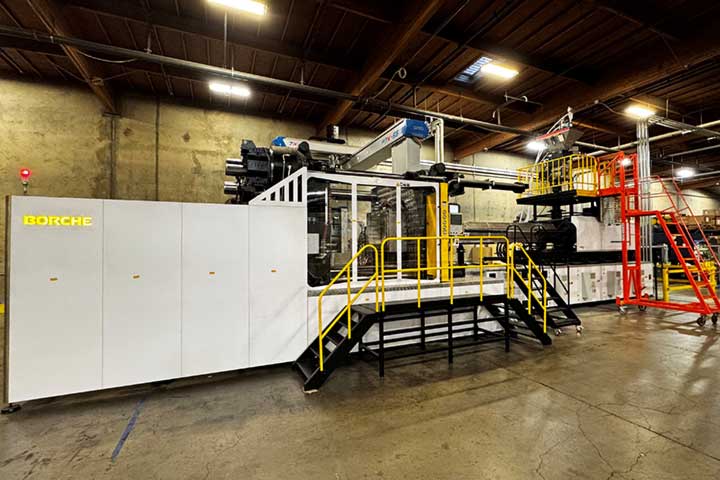
Advanced Large Part Manufacturing Technology
Structural foam molding is an advanced process that creates lightweight yet exceptionally strong plastic parts, making it ideal for large part production. At Norco Plastics, we achieve structural foam components using our high-pressure injection molding machines with specialized foaming agents that create air bubbles when heated, forming a cellular core with a solid outer skin.
Our large tonnage injection molding capabilities are perfectly equipped for structural foam parts, combining high clamping force up to 2800 ton with precise control of injection pressure and plastic melt flow. Unlike traditional low-pressure structural foam machines that use nitrogen injection, our high-pressure process with foaming agents delivers superior results through our conventional injection molding equipment. This advanced approach allows us to manufacture large plastic components with excellent dimensional stability, reduced material consumption, and enhanced structural integrity.
For applications requiring both size and strength, structural foam molding offers the ideal solution by creating large parts with thick wall sections without the sink marks, warpage, or excessive weight typically associated with conventional injection molding processes. The large tonnage process enables consistent structural foam molding quality across complex geometries and challenging design requirements, all while utilizing our high-pressure injection technology.
Benefits of Structural Foam Molding
- Exceptional strength-to-weight ratio for large parts
- Superior structural rigidity with reduced material usage
- Minimal sink marks on thick-walled sections
- Enhanced dimensional stability for large plastic components
- Excellent insulation and sound dampening properties
- Cost-effective solution for large projects
- Compatible with a wide range of engineering-grade resins
- Ideal for complex geometries and thick wall sections
Common Structural Foam Molding Applications
- Material handling containers
- Industrial pallets and dunnage
- Large equipment housings
- Automotive components
- Structural building components
- Furniture and seating
- Heavy-duty cases and containers
- Large consumer products
Advanced Large Part Injection Molding
Precision Manufacturing for Complex Large-Scale Components
Our facility specializes in large tonnage injection molding for part production, delivering exceptional quality and dimensional accuracy. With our high-capacity equipment and capabilities up to 2800 ton, we efficiently manufacture large plastic parts that require substantial material volume. Tonnage injection molding is critical for components with significant plastic injection requirements and complex geometries.
The plastic injection manufacturing process requires careful control of plastic melt flow, injection pressure, and cooling parameters. Our engineers provide guidance on wall thickness and structural integrity options while working to optimize material usage based on your specifications. We utilize advanced molding machines designed specifically for large tonnage applications, ensuring consistent production of durable large plastic components with tight tolerances. Large part injection molding with our large tonnage equipment enables complex geometries not achievable with standard equipment.
Structural foam molding is another specialized process we offer for large parts that require high strength-to-weight ratios. Using our high-pressure injection molding machines with specialized foaming agents, this tonnage molding technique creates parts with solid outer surfaces and cellular cores, providing superior rigidity with reduced material consumption. The substantial clamping force of our equipment helps ensure consistent quality across various materials and designs. Our large part injection molder expertise spans decades of technical advancement in large tonnage injection applications with a focus on safety factors for every project.
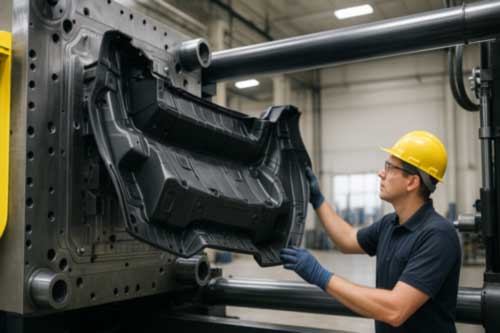
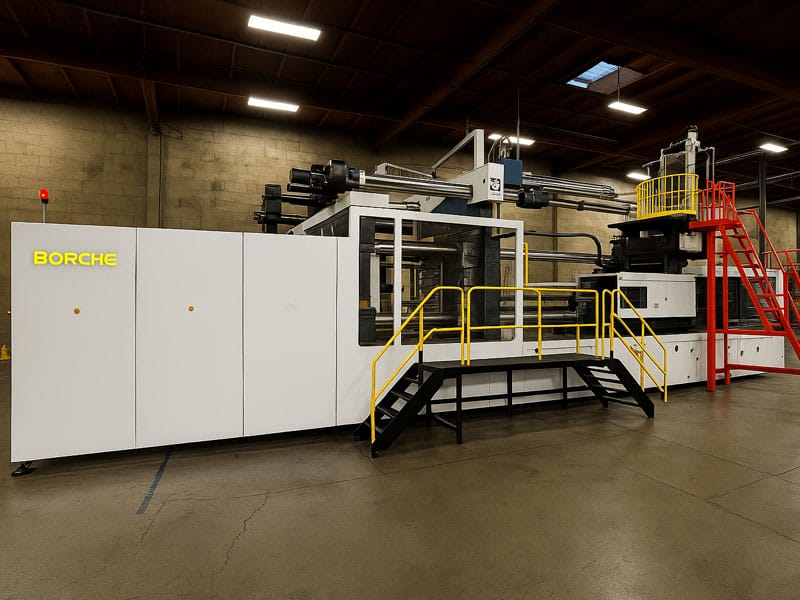
Advanced Manufacturing Capabilities for Large Plastic Parts
Norco Plastics offers industry-leading large tonnage injection molding capabilities with clamping force up to 2800 ton. Our capabilities address the manufacturing process needs of complex plastic injection projects that require significant tonnage injection power. Tonnage injection molding demands exceptional precision and experience, which our team delivers consistently. Our advanced equipment and technical expertise enable the production of large plastic parts with exceptional precision and dimensional control. We provide plastic injection molding services using structural foam molding techniques with high-pressure injection and specialized foaming agents that create components with excellent strength-to-weight ratios for demanding applications. The molding process for these large part injection molding projects requires precise control of temperatures, pressures, and cooling parameters to achieve optimal results. With our large tonnage injection machines, we can handle projects requiring significant plastic melt volume and injection pressure while maintaining tight tolerances throughout the manufacturing process. General injection molding principles apply to all projects, but large tonnage molding requires specialized knowledge of safety factors and material behavior under high pressure conditions - expertise that Norco has developed through decades of experience with large part production for consumer goods and industrial applications.
Get a QuoteHigh-Capacity Manufacturing Solutions
What advantages does Norco's equipment offer for sizeable components?
Our high-capacity equipment offers substantial benefits for creating sizeable components. The use of our capabilities ensures complete mold filling even with complex geometries and thick wall sections. The clamping force allows for optimal material flow and consistent dimensional stability. Our workflow incorporates specialized cooling techniques for large-scale items not possible with standard equipment. Unlike other fabrication approaches, production with high-capacity machinery provides exceptional surface finish and dimensional precision. The techniques we employ can be tailored to different materials and geometries, enabling production of components that would be impossible with conventional equipment. Plastic injection molding at this scale requires specific expertise that our team has developed through decades of hands-on experience.
How does structural foam technology enhance product performance?
Structural foam technology creates components with solid outer surfaces and cellular cores by incorporating foaming agents during production. This technique yields items with exceptional strength-to-weight ratios, making it ideal for applications where weight reduction matters without compromising integrity. At Norco, we utilize high-pressure equipment rather than traditional low-pressure machinery, enabling greater precision and consistency. The resulting items exhibit superior rigidity, excellent dimensional stability, minimal sink marks on thick-walled sections, and enhanced insulation properties. This approach is particularly valuable for material handling containers, industrial housings, and durable items including furniture and storage solutions. The technique requires precise control of injection parameters, foaming agent activation, and cooling cycles to achieve optimal cellular structure. Considerations of large tonnage equipment capabilities are essential when designing optimal structural foam components.
What design considerations matter most when engineering components for production?
When designing components for high-capacity production, several key considerations optimize results and product quality. Proper wall thickness design is crucial - uniformity helps prevent warping, while strategic variations can enhance structural integrity. Draft angles must be carefully planned to facilitate ejection from the mold. Material selection significantly impacts flow characteristics, cooling time, and properties. Gate location and size must be strategically placed to ensure complete mold filling while minimizing visible marks. For structural foam applications, additional design elements must account for the cellular core formation. Every design requires appropriate safety factor calculations based on intended load requirements, environmental exposure, and service life expectations. When using equipment of large tonnage, these safety factors become particularly important due to the significant forces involved. Our team provides guidance on these considerations based on our extensive experience with similar components. Plastic injection molding at this scale requires specialized design approaches that differ substantially from smaller-scale production techniques.
How are structural integrity and safety factors incorporated into component design?
Incorporating appropriate safety factors into component design is critical for ensuring long-term performance and reliability. Our engineering team works with customers to understand the specific load requirements, environmental exposures, and service life expectations for each component. Safety factors are mathematically calculated ratios between maximum allowable stress and expected operating stress, typically ranging from 1.2 for non-critical applications to 3.0 or higher for components where failure could have serious consequences. These safety factors inform decisions about wall thickness, reinforcement placement, and material selection. The development of proper safety factors requires understanding both material properties and the capabilities of large tonnage equipment used in production. With our techniques, we can incorporate varying wall thicknesses and strategic reinforcement ribs to achieve the necessary structural integrity while minimizing material usage, weight, and cycle time. Plastic injection molding with appropriate safety factors results in components that perform reliably throughout their intended service life.
What materials work best with our production capabilities?
For our production capabilities, several materials perform exceptionally well depending on specific requirements. Engineering-grade resins like polypropylene, HDPE, and ABS are commonly used due to their excellent flow characteristics, structural stability, and cost-effectiveness. For applications requiring enhanced strength, glass-filled nylon or polycarbonate provides superior mechanical properties. When utilizing structural foam techniques, materials that respond well to foaming agents include polypropylene, polystyrene, and polyethylene. For items that need chemical resistance, modified polypropylenes and specialty compounds can be recommended. Material selection should consider factors such as expected operating environment, mechanical load requirements, aesthetic considerations, and component size. Our technical team can provide guidance based on your application needs, helping identify options that balance performance requirements with production considerations. Parameters are then optimized for each specific material to ensure consistent quality. The workflow of injection molding with different materials requires specific adjustments to temperature, pressure and cooling profiles.
How do high-capacity techniques differ from standard approaches?
High-capacity techniques differ significantly from standard approaches in several important ways. They require substantially more clamping force to counteract the higher pressures needed for filling larger molds. This increases mold design complexity, requiring robust construction to withstand these forces while maintaining precision. The workflow must carefully manage significantly larger volumes of material melt, with our machines handling up to 1000 oz shot sizes compared to just a few ounces in standard equipment. Heating and cooling cycles are more sophisticated, as larger components require precise temperature control throughout the substantial mass to prevent defects. Parameters must be carefully controlled to ensure complete filling of large cavities while avoiding issues like flash or short shots. Additionally, cycle times are typically longer due to extended cooling requirements, affecting production planning and efficiency calculations. Injection molding at this scale demands specialized knowledge that conventional molders often lack.
What industries benefit from our specialized production methods?
Our specialized production methods benefit numerous industries requiring substantial components. The transportation and automotive sector utilizes our services for dashboards, interior panels, and structural elements that demand precise dimensional control and appropriate safety factors for vehicular applications. Material handling industries rely on our expertise for durable containers, pallets, and logistics equipment. Construction and infrastructure benefit from our ability to produce weatherproof housings, utility components, and architectural elements. Agricultural equipment manufacturers utilize our services for equipment housings and components that must withstand harsh outdoor conditions. Our techniques can be adapted to the specific requirements of each industry, ensuring optimal performance for the intended application while maintaining cost-effectiveness. Plastic injection molding at these scales enables solutions not possible with other manufacturing techniques.
What size capabilities does Norco offer with its equipment?
With our 2800 ton machinery and shot capacity up to 1000 oz, Norco can manufacture exceptionally sizeable components for various applications. The maximum practical dimensions depend on several factors including geometry, material selection, and wall thickness requirements. Our equipment can typically handle items with a projected area of several square feet. For flat components like pallets, we can produce pieces approaching 48"x48" with moderate wall thickness. Three-dimensional items with complex geometries may have different size limitations based on their specific design. The weight of finished components can range from several pounds to over 50 pounds depending on material density and design. Production of substantial items requires specialized knowledge of material flow behavior, gating strategies, and cooling parameters. Our team can evaluate your specific needs to determine feasibility and recommend design modifications that might improve manufacturability. The use of equipment of large tonnage enables production possibilities that smaller machines simply cannot match.
Need High-Capacity Large Tonnage Injection Molding for Complex Projects?
Contact us about your next project. Our facility features advanced equipment with clamp tonnage up to 2800 ton for manufacturing oversized plastic parts. Our large-tonnage injection molding capabilities set us apart from competitors. We offer both conventional injection molding and structural foam molding processes with superior quality control. Each molding machine in our facility is designed for maximum precision. Our experienced team delivers reliable production with 24/7 manufacturing capabilities.

